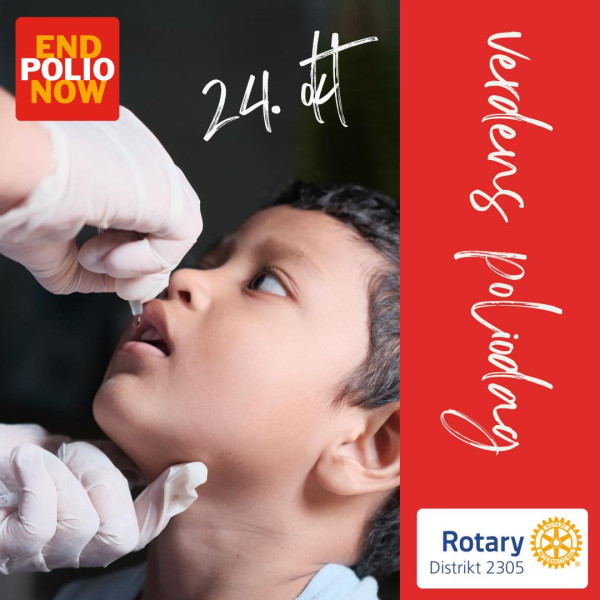Verdens Poliodag 24. oktober
Verdens Poliodag den 24. oktober markeres verden over av klubbene i Rotary. Rotary International er i førersetet når det gjelder bekjempelse og utryddelse av sykdommen Polio. Men det behøves penger til det viktige vaksinasjonsarbeidet. Støtt oss med VIPPS til 577258.

Bill Gates støtter arbeidet:
Gates, og Melinda og Bill Gates fond er en av de andre viktige medspillerne i denne kampen. Vaksinering er metoden som brukes for bekjempelse/ utrydding.
Resultatene som er oppnådd er fantastiske gode. Både Polio type-vill-2 og type-vill-3 er nå utryddet. Nå gjenstår kun Polio type-1 som forekommer i Afghanistan og Pakistan. I dag er vi svært nærme å kunne lykkes!
For hver 100-lapp vi i Rotaryklubbene samler inn til formålet, - vil Bill Gates legge til 100-lapper. Dvs våre 100 kroner blir til 300 kroner. Da monner det!
Støtt oss i dette arbeidet med VIPPS til Gjøvik Rotaryklubb, 577258.
Les et innlegg om saken fra Bill Gates her:
Vi er nærmere enn noensinne å utrydde polio
.

...Og nærmere enn noensinne å se en gjenoppblomstring. Av Bill Gates, publisert for 7 dager siden
Når folk flest i Amerika tenker på polio, tenker vi nok på president Franklin Delano Roosevelt. I 1921, i en alder av 39 år, ble han lammet av viruset og fikk aldri tilbake beina. Historien hans bidro til å gjøre polio til en nasjonal sak. Men på mange måter var opplevelsen hans en anomali.
Polio er tross alt i overveldende grad en barnesykdom, og de aller fleste tilfellene rammer de under fem år. Det var sant da FDR ble syk, og det er sant i dag. Den typiske pasienten er ikke en voksen med en allerede etablert politisk karriere – det er et lite barn, ofte et lite barn i et lavinntektsland, som kanskje aldri får sjansen til å ta sine første skritt.
Den urettferdigheten er en viktig grunn til at jeg har brukt de siste to tiårene på å utrydde polio. Den andre grunnen er at utryddelse faktisk er mulig, realistisk og innen rekkevidde. Dette er en sykdom vi kan bli kvitt – ikke bare kontrollere, men eliminere overalt. Det er en sjeldenhet innen global helse.
Verden har allerede gjort ekstraordinære fremskritt. Tilbake i 1988, da Rotary International og Verdens helseforsamling satte seg målet om utryddelse, lammet viruset mer enn 350 000 barn hvert år i 125 land. Siden den gang har tilfellene falt med 99,9 prosent. Stammene kjent som type 2 og type 3 vill poliovirus er utryddet. Hele det afrikanske kontinentet er sertifisert fritt for vill polio. Bare to land – Afghanistan og Pakistan – har fortsatt vedvarende overføring av type 1 vill poliovirus.
Nå er vi nærmere enn noensinne fullstendig utryddelse av polio. Men den siste milen viser seg å være den vanskeligste fordi virus finner måter å utnytte eventuelle immunitetshull eller svakheter. Der vaksinasjonsratene faller – selv kortvarig – kan de dukke opp igjen.
En av de største utfordringene kommer fra det som kalles variantutbrudd. I lokalsamfunn der immuniseringen er lav, kan det svekkede viruset som brukes i den orale poliovaksinen sirkulere asymptomatisk og i sjeldne tilfeller, over tid, mutere nok til å gjenvinne evnen til å forårsake lammelse hos uvaksinerte barn.
Selv om de fleste variantutbrudd skjer på steder med ekstremt lav vaksinasjonsdekning, dårlige sanitærforhold og svakere helsesystemer, er ingen steder risikofrie før verden er poliofri. I 2022 bekreftet USA sitt første tilfelle av lammelse av polio på nesten et tiår , og viruset ble oppdaget i avløpsvannsprøver fra New York. I tiden siden har varianter av poliovirus også blitt funnet i Storbritannia, Ukraina, Indonesia og andre land.
Den gode nyheten er at dagens verktøy er bedre enn noe vi hadde for bare fem år siden, og de sørger for at hver krone som brukes på saken går lenger enn noen gang før. Vi har en ny oral vaksine, nOPV2, som har langt mindre sannsynlighet for å mutere og føre til nye variantutbrudd; nesten to milliarder doser har allerede blitt gitt over hele verden. Nye regionale laboratorier i Ghana, Nigeria, Sør-Afrika og Uganda som tester avløpsvannsprøver og sekvenserer virus har redusert deteksjonstiden med over 30 prosent, noe som gir helsearbeidere et kritisk forsprang på utbruddsresponsen. Og overvåkingsnettverket for polio er et av de mest sofistikerte som noen gang er bygget – og bidrar også til å varsle helsepersonell om utbrudd av kolera, meslinger, ebola og til og med COVID-19 på høyden av den pandemien.
Gates Foundation har vært stolte av å støtte disse fremskrittene som en del av Global Polio Eradication Initiative , en koalisjon mellom WHO, UNICEF, CDC, Gavi, Rotary International og dusinvis av lands regjeringer. Det er et av de mest vellykkede samarbeidene i den globale helsehistorien.
Men akkurat nå står GPEI overfor et finansieringsgap på 1,7 milliarder dollar , ettersom diverse langsiktige giverland som har kuttet ned støtten sin. Uten de riktige ressursene må vaksinasjonskampanjer kanskje reduseres, overvåkingssteder vil sannsynligvis stenge, og viruset kan spre seg globalt.
I århundret siden FDR ble lammet av viruset, har amerikansk lederskap og generøsitet bidratt til å gjøre polio til en kamp hele verden kunne vinne. Fra March of Dimes, som finansierte forskning, til utviklingen av de første vaksinene, til støtte for utryddelseskampanjer, har amerikansk engasjement vært avgjørende.
Verden står på randen av å utrydde denne forferdelige sykdommen, og innsatsen i dette øyeblikket kunne ikke vært høyere. Hvis vi fullfører jobben, frigjør vi milliarder av dollar til andre helseprioriteringer og – viktigst av alt – beskytter vi generasjoner av barn mot et virus som har lammet millioner. Hvis vi gir etter fra kampen, kan opptil 200 000 barn bli lammet hvert år innen et tiår.
Vi har de vitenskapelige verktøyene og infrastrukturen som trengs for å krysse målstreken. Og vi har hundretusenvis av engasjerte vaksinatører som er fast bestemt på å få oss dit – som går fra dør til dør gjennom ørkener, jungler, flomsletter og krigssoner for å sørge for at ingen barn blir savnet. Jeg har møtt dem, jeg har hørt historiene deres, og jeg har sett hvor fast bestemt de er på å fullføre jobben.
Det burde vi også være.
8. august 2022
Første møte i nytt Rotary-år
President Jørn Wroldsen ønsket medlemmene velkommen til kaffemøte, - det første møtet i Rotaryåret 2022-2023. Han håpet alle hadde hatt en fin sommerferie. Mange medlemmer var møtt fram, - og som vanlig under kaffemøtene gikk praten lett rundt bordene.
2. juli 2022
Hunn/Gjøvik Rotaryklubb feiret 40 års jubileum
"Mitt siste oppdrag som president" sa Tor Odd etter festen! Stor fest med mange gjester hos naboklubben Hunn/ Gjøvik da de feiret sine første 40 år! Flott arrangement kombinert med presidentskifte for klubben, samt guvernørskifte for Rotary Distrikt 2305.
30. juni 2022
Hedersbevisningen til Bjørn Blichfeldt
Under Gjøvik Rotaryklubbs sommeravslutning i juni ble Bjørn Blichfeldt tildelt Paul Harris Fellow Recognition. Dette er Rotarys høyeste utmerkelse og tildeles Bjørn for hans betydelige samfunnsnyttige arbeid og hans innsats for Rotary over mange år.
18. juni 2022
Presidentskifte og grillfest i Gjøvik Rotary.
Flott sommeravslutning med presidentskifte og grillfest i Gjøvik Rotaryklubb!
Onsdag 15. juni var det tid for den tradisjonell sommeravslutning med presidentskifte, kjempegod grillmat og god stemning! Værgudene spilte også på lag og bidro til festen!
12. juni 2022
Klubbens fremtidige samfunnsprosjekter
Onsdag 8. juni hadde klubben kaffe-møte med godt oppmøte, - og svært gode kaker til kaffen. Som vanlig ble noen Rotary-saker tatt opp og gjennomgått. Denne gangen var det klubbens studentutveksling og våre fremtidige samfunnsprosjekter som var tema.
10. juni 2022
Besøk i Gjøviks nye By-Badstue
Bedriftsbesøket på By-Badstua på Mjøsstranda den 1. juni trakk mange interesserte klubb-medlemmer. Vi fikk omvisning i badstua og orienteringer om framtidige planer av en engasjert Bylab-ansatt, Anne Marthe Zettervall. Spennende ting er på gang!
21. mai 2022
Bedriftsbesøk i GOBB hallen / Vind idrettslag 18 mai.
Det var stort oppmøte med 19 deltagere fra oss og vi ble tatt vel imot av daglig leder Ketil Gjerde. Vind Idrettslag har hatt en imponerende utvikling og vekst og de har nå en omsetning på 17 millioner kroner og 7 personer ansatt fordelt på 6,5 årsverk. I
19. mai 2022
Reportasje i Gjøviks Blad - Rotaryklubben rengjør Skibladner
Den Hvite Svane må vaskes og rengjøres, og messing må pusses før sesongstart. Journalisten fra Gjøviks Blad møtte opp og laget helsides reportasje i avisa da Gjøvik Rotaryklubb gjennomførte den årlige dugnaden på Skibladner.
12. mai 2022
Dugnad med vårrengjøring på Skibladner
Når Skibladner skal seile på Mjøsa, må båten være gullende ren og messingen blank! Gjøvik Rotaryklubb satte alle kluter til i en god dugnadsinnsats den 11. mai for å gjøre den flotte hjuldamperen seilingsklar for sommersesongen.
